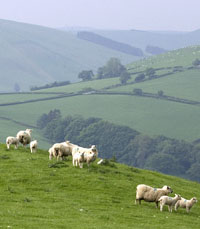Welsh Assembly publishes farming strategy

The Welsh assembly has committed itself to 118 actions designed to help the farming, food and land based industries over the next decade.
The pledges are contained in the new strategy document Farming Food & Countryside-Building a Secure Future, which was developed through extensive consultation, including input from a stakeholder group representing all sectors of the industry.
It outlines how the Welsh Assembly Government will work to secure a sustainable future for the farming and food sectors and the Welsh countryside up to 2020.
Having described the challenges faced by family farmers, including globalisation, market changes and environmental pressures, the strategy commits the Welsh assembly to a comprehensive raft of actions.
The document’s key policy aims are connecting producers to the market place, fostering sustainability and profitability and safeguarding animal health and welfare, plant health and food safety.
But the strategy also seeks to sustain the countryside and rural environment, while encouraging innovation and diversification.
It acknowledges the crucial importance of profitability and warns that a declining farming industry will “threaten the sustainability of rural communities”.
“Receiving fair prices for what they produce is a key concern for farmers,” the strategy admits.
“The CAP has long had the effect of making it hard for farmers to read market signals.
“This has been compounded in Britain by the way in which the lack of really strong farmer co-operatives has limited the stake that farmers have in the food chain beyond the farm gate.
“In future the assembly’s Farming Connect initiative will encourage and support collaborative marketing, including training those involved,” the document states.
The strategy also calls for collaboration between primary producers, processors and food retailers. And it commits the assembly to working for the extension of the supermarket code of practice and to further development of the concept of a supply chain ombudsman.
“The assembly will strengthen local supply chains, reducing the number of linkages to give farmers a better deal while also addressing concerns about sustainability and food security.”
The plan also pledges to provide a mix of in-depth husbandry and business advice and to improve technology transfer and benchmarking.
There are also promises to work with the industry to prevent and control animal and plant diseases, and to support experimentation into more effective ways of disposing of fallen stock.
But all initiatives to improve farm incomes will be linked to environmentally friendly land management systems, and to helping farmers contribute to slowing climate change.
Elin Jones, assembly rural affairs minister, launched the document on a farm at Dinas Mawddwy near Machynlleth, where the family’s enterprises include the production of organic lamb and beef, bottling and selling water and running a pub.
Ms Jones said: This important strategy sets out a clear vision of Welsh farming that is at the heart of a sustainable countryside and a profitable rural economy.”
Some 17,000 Welsh farmers had annual sales worth £101m and continuing Wales’ role as a food producing country was central to the strategy.
“Through committed partnership I am confident that the farming industry in Wales has a bright future,” Ms Jones claimed.
